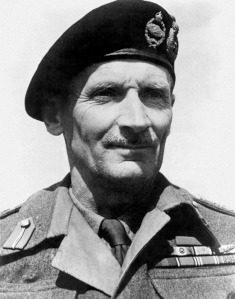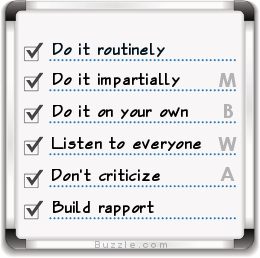What aspiring leaders can learn from Montgomery
By Frederick Mordi
One of the greatest heroes of the Second World War was an unprepossessing British general named Bernard Montgomery. He was of average height and slender stature. But when he spoke, his voice was like thunder. He was a maverick and a no-nonsense man, who commanded the respect of both his superiors and his subordinates.
Due to his charismatic nature, his superiors entrusted him with the task of halting the German offensive at the North African theatre of war, even though he was not the most senior military officer at the time. He eventually managed to turn the tables against the famous German general Erwin Rommel and his Afrika Korps, against all odds. Had Montgomery failed in this important assignment, historians say Great Britain would have probably lost the war.
The first thing he did when he took charge of affairs of the Eighth Army was to change the mentality of his men, whose morale was at the lowest ebb. He understood that only a ‘culture change’ could produce the kind of results that he envisioned. He gave a powerful speech full of imagery that galvanised his disillusioned soldiers into action. The speech is regarded as one of the most inspiring in history. Every aspiring leader in an organisation should learn from the speech, whose slightly edited version is reproduced below:
“I want first of all to introduce myself to you. You do not know me. I do not know you. But we have got to work together. Therefore we must understand each other and we must have confidence in each other. I have only been here a few hours. But from what I have seen and heard since I arrived I am prepared to say, here and now, that I have confidence in you. We will then work together as a team. And together we will gain the confidence of this great Army and go forward to final victory in Africa.
“I believe that one of the first duties of a commander is to create what I call “atmosphere,” and in that atmosphere his staff, subordinate commanders, and troops will live and work and fight. I do not like the general atmosphere I find here. It is an atmosphere of doubt. All that must cease. Let us have a new atmosphere. . . Here, we will stand and fight; there will be no further withdrawal. I have ordered that all plans and instructions dealing with further withdrawal are to be burned, and at once. We will stand and fight here. If we can’t stay here alive, then let us stay here dead.
“Our mandate from the Prime Minister is to destroy the Axis forces in North Africa. And it will be done. If anyone here thinks it can’t be done, let him go at once. I don’t want any doubters in this party. It can be done, and it will be done, beyond any possibility of doubt.
“I have no intention of launching our great attack until we are completely ready. There will be pressure from many quarters to attack soon. I will not attack until we are ready and you can rest assured on that point . . . I understand there has been a great deal of “belly-aching” out here. By “bellyaching” I mean inventing poor reasons for not doing what one has been told to do. All this will stop at once. If anyone objects to doing what he is told then he can get out and at once. I want that made very clear right down through the Eighth Army.
“What I have done is to get over to you the atmosphere in which we will now work and fight. You must see that that atmosphere permeates right down through the Eighth Army to the most junior private soldier. All the soldiers must know what is wanted. When they see it coming to pass there will be a surge of confidence throughout the Army.
“I ask you to give me your confidence and to have faith that what I have said will come to pass. . . I am always available to be consulted by the senior officers of the staff. The great point to remember is that we are going to finish with this chap Rommel once and for all. It will be quite easy. There is no doubt about it.”
This simple speech full of candour and devoid of pretentious phrases, replaced fear with courage, doubt with conviction, and hopelessness with confidence. Thus, he won his first victory without firing a single shot! He understood ‘atmosphere’ a term for morale, mattered a lot and he took immediate steps to create a favourable condition for the soldiers to operate in. He was methodical in his approach and he paid attention to the minutest details. This yielded dividends.
Montgomery also pioneered what is today known as ‘management by walking about’ in organisational parlance, by mixing freely with his soldiers, getting to know their problems first-hand, and offering solutions. This greatly boosted the morale of the Army. He allowed them to use their initiative unlike the rigid regime that his predecessors had put in place.
In addition, he called his commanders by name, creating a sense of belonging in them. He further chose to wear his simple trademark beret to identify with the rank and file. All these simple tactics contributed in no small measure to the decisive victory he recorded against the Germans.
In an organisation, leaders that inspire confidence in their subordinates are more likely to succeed than those who instil fear in them.
Tags: afrika korps, author of the familiar stranger & other stories, bernard montgomery, ermin rommel, Fred Mordi, Frederick Mordi, management by walking about, montgomery beret, montgomery's speech north africa, morale organisations, pioneer of management by walking about mbwa, what aspiring leaders can learn from montgomery
About frederickmordi
Writer. Author of The Talent Coach, and The Familiar Stranger and Other Stories. The Senator's Car, one of the stories, won a Commonwealth Award.2 responses to “What aspiring leaders can learn from Montgomery”
Leave a reply to frederickmordi Cancel reply
Recent Posts
Recent Comments
Archives
- February 2024
- September 2023
- November 2018
- June 2018
- August 2017
- January 2017
- December 2016
- September 2016
- August 2016
- July 2016
- June 2016
- April 2016
- February 2016
- January 2016
- December 2015
- November 2015
- October 2015
- August 2015
- July 2015
- June 2015
- May 2015
- April 2015
- March 2015
- February 2015
- January 2015
- December 2014
- November 2014
- October 2014
- September 2014
- August 2014
- June 2014
- May 2014
- January 2014
- December 2013
- August 2013
- July 2013


Cool.
Sent from my iPhone
>
Thanks!